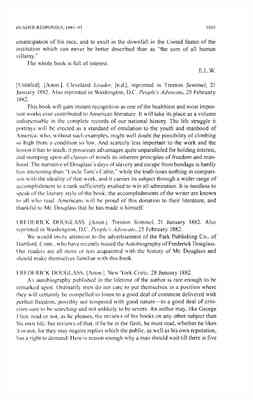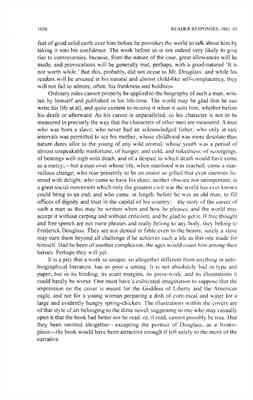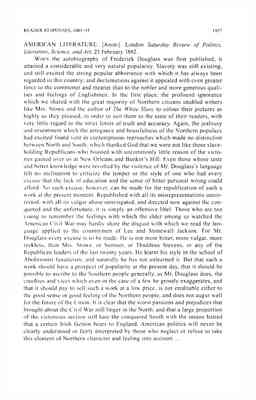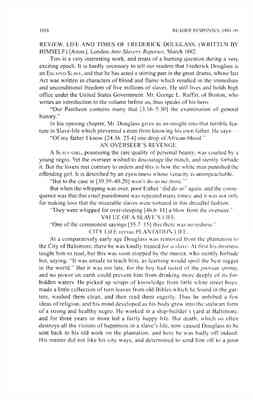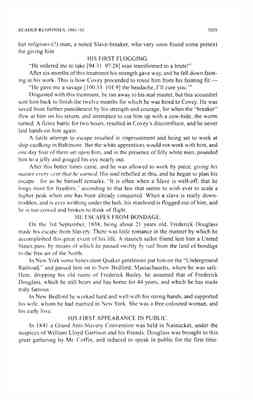Pages
11
READER RESPONSES, 1881-93 1055
emancipation of his race, and to exult in the downfall in the United States of the institution which can never be better described than as "the sum of all human villainy."
The whole book is full of interest.
E.L.W.
[Untitled]. [Anon.]. Cleveland Leader, [n.d.], reprinted in Trenton Sentinel, 21 January 1882. Also reprinted in Washington, D.C. People's Advocate, 25 February 1882.
This book will gain instant recognition as one of the healthiest and most important works ever contributed to American literature. It will take its place as a volume indispcnsable in the complete records of our national history. The life struggle it portrays will be erected as a standard of emulation to the youth and manhood of America, who, without such examples, might well doubt the possibility of climbing so high from a condition so low. And scarcely less important to the work and the lesson it has to teach, it possesses advantages quite unparalleled for holding interest, and stamping upon all classes of minds its inherent principles of freedom and manhood. The narrative of Douglass's days of slavery and escape from bondage is hardly less interesting than "Uncle Tom's Cabin," while the truth loses nothing in comparison with the ideality of that work, and it carries its subject through a wider range of accomplishment to a rank sufficiently exalted to win all admiration. It is needless to speak of the literary style of the book: the accomplishments of the writer are known to all who read Americans will be proud of this donation to their literature, and thankful to Mr. Douglass that he has made it himself.
FREDERICK DOUGLASS. [Anon.]. Trenton Sentinel, 21 January 1882. Also reprinted in Washington, D.C. People's Advocate, 25 February 1882.
Wc would invite attention to the advertisement of the Park Publishing Co., of Hartford, Conn., who have recently issued the Autobiography of Frederick Douglass. Our readers are all more or less acquainted with the history of Mr. Douglass and should make themselves familiar with this book.
FREDERICK DOUGLASS. [Anon.]. New York Critic, 28 January 1882.
AN autobiography published in the lifetime of the author is rare enough to be remarked upon. Ordinarily men do not care to put themselves in a position where they will certainly be compelled to listen to a good deal of comment delivered with perfect freedom, possibly not tempered with good nature- to a good deal of criticism sure to be searching and not unlikely to be severe. An author may, like George Eliot, read or not, as he pleases, the reviews of his books on any other subject than his own life; but reviews of that, if he be in the flesh, he must read, whether he likes it or not, for they may require replies which the public, as well as his own reputation, has a right to demand. Here is reason enough why a man should wait till there is five
12
1056
READER RESPONSES, 1881-93
feet of good solid earth over him before he provokes the world to talk about him by taking it into his confidence. The work before us is not indeed very likely to give rise to controversies, because, from the nature of the case, great allowances will be made, and provocations will be generally met, perhaps, with a good-natured 'It is not worth while.' But this, probably, did not occur to Mr. Douglass: and while his readers will be amused at his natural and almost child-like self-complacency, they will not fail to admire, often, his frankness and boldness. Ordinary rules cannot properly be applied to the biography of such a man, written by himself and published in his life-time. The world may be glad that he can write his life at all, and quite content to receive it when it suits him, whether before his death or afterward. As his career is unparalleled. so his character is not to be measured in precisely the way that the characters of other men are measured. A man who was born a slave: who never had an acknowledged father: who only at rare intervals was permitted to see his mother: whose childhood was more desolate than nature dares allot to the young of any wild animal: whose youth was a period or almost unspeakable misfortune, of hunger. and cold. and nakedness. of scourgings. of beatings well nigh unto death, and of a despair to which death would have come as a mercy:- but a man over whose life, when manhood was reached. came a marvellous change: who rose presently to be an orator so gifted that even enemies listened with delight; who came to have his share. neither obscure nor unimrortant. in a great social movement which only the greatest civil war the world has ever known could bring to an end; and who came, at length. before he was an old man. to fill offices of dignity and trust in the capital of his country:-- the story of the career or such a man as this may be written when and how he pleases. and the world may accept it without carping and without criticism. and be glad to get it. Ir free thought and free speech are not mere phrases and really belong to any body. they belong to Frederick Douglass. They are not denied in fable even to the beasts: surely a slave may earn them beyond all challenge if he achieves such a life as this one made ror himself. Had he been of another complexion. the ages would count him among their heroes. Perhaps they will yet. It is a pity that a work so unique. so altogether different from anything in autobiographical literature. has so poor a setting. It is not absolutely had in tyre and paper; but in its binding, its scant margins. its press-work. and its illustrations it could hardly be worse. One must have a cult ivated imagination to surpose that the impression on the cover is meant for the Goddess of Liberty and the American eagle, and not for a young woman preparing a dish of corn-meal and water for a large and evidently hungry spring-chicken . The illustrations within the covers are of that style of art belonging to the dime novel. suggesting to one who may casually open it that the book had better not be read. or. if read. cannot rossihly he true. Had they been omitted altogether--excepting the portrait of Douglass, as a frontispiece-the book would have been attractive enough if left solely to the merit of the narrative.
13
READER RESPONSES, 1881-93 1057
AMERICAN LITERATURE. [Anon.]. London Saturday Review of Politics, Literature, Science, and Art, 25 February 1882.
When the autobiography of Frederick Douglass was first published, it attained a considerable and very natural popularity. Slavery was still existing, and still excited the strong popular abhorrence with which it has always been regarded in this country; and declamations against it appealed with even greater force to the commoner and meaner than to the nobler and more generous qualities and feelings of Englishmen. In the first place, the profound ignorance which we shared with the great majority of Northern citizens enabled writers like Mrs. Stowe and the author of The White Slave to colour their pictures as highly as they pleased, in order to suit them to the taste of their readers, with very little regard to the strict limits of truth and accuracy. Again, the jealousy and resentment which the arrogance and boastfulness of the Northern populace had excited found vent in contemptuous reproaches which made no distinction between North and South, which thanked God that we were not like those slaveholding Republicans who boasted with uncommonly little reason of the victories gained over us at New Orleans and Bunker's Hill. Even those whose taste and better knowledge were revolted by the violence of Mr. Douglass's language felt no inclination to criticize the temper or the style of one who had every excuse that the lack of education and the sense of bitter personal wrong could afford. No such excuse, however, can be made for the republication of such a work at the present moment. Republished with all its misrepresentations uncorrected, with all its vulgar abuse unmitigated, and directed now against the conquered and the unfortunate, it is simply an offensive libel. Those who are too young to remember the feelings with which the elder among us watched the American Civil War may hardly share the disgust with which we read the language applied to the countrymen of Lee and Stonewall Jackson. For Mr. Douglass every excuse is to he made. He is not more bitter, more vulgar, more reckless, than Mrs. Stowe, or Sumner, or Thaddeus Stevens, or any of the Republican leaders of the last twenty years. He learnt his style in the school of Abolitionist fanaticism, and naturally he has not unlearned it. But that such a work should have a prospect of popularity at the present day, that it should be possible to ascribe to the Southern people generally, as Mr. Douglass does, the cruelties and vices which even in the case of a few he grossly exaggerates, and that it should pay to sell such a work at a low price, is not creditable either to the good sense or good feeling of the Northern people, and does not augur well for the future of the Union. It is clear that the worst passions and prejudices that brought about the Civil War still linger in the North, and that a large proportion of the victorious section still hate the conquered South with the insane hatred that a certain Irish faction bears to England. American politics will never be clearly understood or fairly interpreted by those who neglect or refuse to take this element of Northern character and feeling into account....
14
1058 READER RESPONSES, 1881-93
REVIEW. LIFE AND TIMES OF FREDERICK DOUGLASS. (WRITTEN BY HIMSELF.) [Anon.). London Anti-Slave,y Reporter. March 1882.
This is a very interesting work, and treats of a burning question during a very exciting epoch. It is hardly necessary to tell our readers that Frederick Douglass is an ESCAPED SLAVE, and that he has acted a stirring part in the great drama whose last Act was written in characters of blood and flame, which resulted in the immediate and unconditional freedom of five millions of slaves. He still lives and holds high office under the United States Govement. Mr. George I. Ruffin, of Boston, who writes an introduction to the volume before us, thus speaks of his hero:--
''Our Pantheon contains many that [3.16---5.30] the examination of general history."
In his opening chapter. Mr. Douglass gives us an insight into that terrible feature in Slave-life which prevented a man from knowing his own father. He says:--
"Of my father I know [24.36- 25.4] one drop of African blood."
AN OVERSEER'S REVENGE:
A SLAVE-GIRL, possessing the rare quality of personal beauty. was courted by a young negro. Yet the overseer wished to discourage the match, and sternly forbade it. But the lovers met contrary to orders and this is how the white man punished the offending girl. It is described by an eyewitness whose veracity is unimpeachable.
"But to the case in [39.39-40.20] won't do so no more ....
But when the whipping was over, poor Esther "did do so" again, and the consequence was that this cruel punishment was repeated many times: and it was not only for making love that the miserable slaves were tortured in this dreadful fashion.
"They were whipped for over-sleeping [46.6-11] a blow from the overseer."
VALUE OF A SLAVE'S LIFE.
"One of the commonest sayings [55 .7- 15] this there was no redress ...
CITY LIFE verses PLANTATION LIFE..
At a comparatively early age Douglass was removed from the plantation to the City of Baltimore. There he was kindly treated for a slave. At first his mistress taught him to read, but this was soon stopped by the master. who sternly forbade her, saying, "It was unsafe to teach him, as learning would spoil the best nigger in the world." But it was too late, for the boy had tasted of the pierian spring. and no power on earth could prevent him from drinking more deeply of its forbidden waters. He picked up scraps of knowledge from little white street boys; made a little collection of torn leaves from old Bibles which he found in the gutters, washed them clean, and then read them eagerly. Thus he imbibed a few ideas of religion, and his mind developed as his body grew into the stalwart form of a strong and healthy negro. He worked in a ship-builder's yard at Baltimore. and for three years or more led a fairly happy life. But death, which so often destroys all the visions of happiness in a slave's life, now caused Douglass to be sent back to his old work on the plantation, and here he was badly off indeed. His master did not like his city ways, and determined to send him off to a poor
15
READER RESPONSES, 1881-93 1059
but religious (?) man, a noted Slave-breaker, who very soon found some pretext for giving him
HIS FIRST FLOGGING.
"He ordered me to take [94.31~97.28] man transformed to a brute!"
After six months of this treatment his strength gave way, and he fell down fainting at his work. This is how Covey proceeded to rouse him from his fainting fit: -----
"He gave me a savage [ 100.33-101.9] the headache, I'll cure you.""
Disgusted with this treatment, he ran away to his real master, but this scoundrel sent him back to finish the twelve months for which he was hired to Covey. He was saved from further punishment by his strength and courage, for when the "breaker" flew at him on his return, and attempted to cut him up with a cow-hide, the worm turned. A fierce battle for two hours, resulted in Covey's discomfiture, and he never laid hands on him again.
A futile attempt to escape resulted in imprisonment and being set to work at ship-caulking in Baltimore. But the white apprentices would not work with him, and one day four of them set upon him, and in the presence of fifty white men, pounded him to a jelly and gouged his eye nearly out.
After this better times came, and he was allowed to work by piece, giving his master every cent that he earned. His soul rebelled at this. and he began to plan his escape--- fix as he himself remarks. "It is often when a Slave is well-off, that he longs most for freedom." according to that law that seems to wish ever to scale a higher peak when one has been already conquered. When a slave is really downtrodden, and is ever writhing under the lash, his manhood is flogged out of him, and he is too cowed and broken to think of flight.
HE ESCAPES FROM BONDAGE.
On the 3rd September. 1838. being about 21 years old, Frederick Douglass made his escape from Slavery. There was little romance in the manner by which he accomplished this great event of his life. A staunch sailor friend lent him a United States pass, by means of which he passed swiftly by rail from the land of bondage to the free air of the North.
In New York some benernlent Quaker gentlemen put him on the "Underground Railroad." and passed him on to New Bedford. Massachusetts, where he was safe. Here. dropping his old name of Frederick Bailey, he assumed that of Frederick Douglass. which he still bears and has borne for 44 years. and which he has made truly famous.
In New Bedford he worked hard and well with his strong hands, and supported his wife. whom he had married in New York. She was a free-coloured woman, and his early love.
HIS FIRST APPEARANCE IN PUBLIC.
In 1841 a Grand Anti-Slavery Convention was held in Nantucket, under the auspices of William Lloyd Garrison and his friends. Douglass was brought to this great gathering by Mr. Coffin. and induced to speak in public for the first time.
